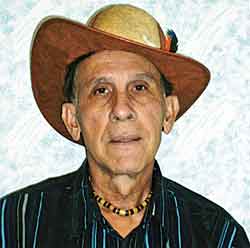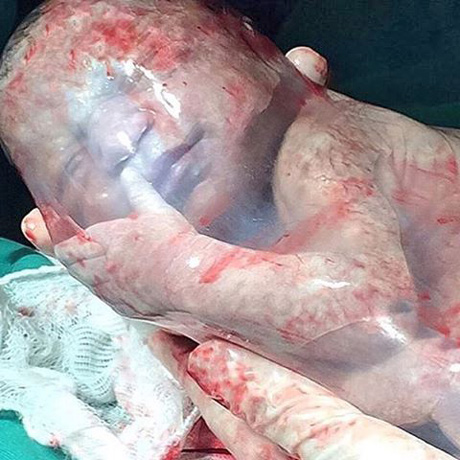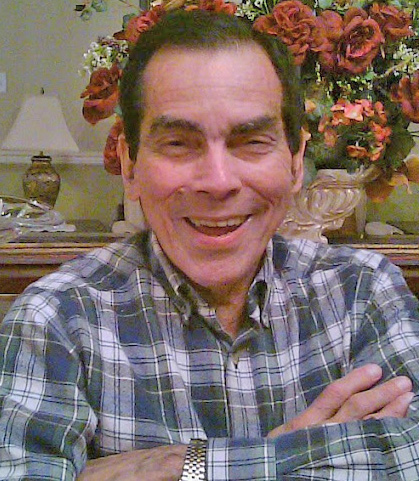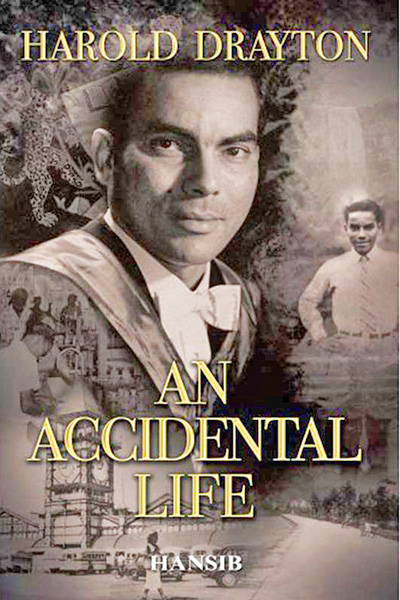October 18, 2017 issue
Authors' & Writers' Corner
of the 'caul'

Bernard Heydorn
Caul has a long history. Described as a membrane, (part of the amniotic sac), that can cover a newborn baby’s head or entire body, it has attracted much superstition, folklore and stories. It is a rare occurrence, reportedly occurring once in 80,000 births (Wikipedia). As it turned out, I was born with caul. Why me?
At my birth, the midwife reportedly instructed my father to take the caul otside and bury it “fast, fast”, even though it was the middle of a thunderstorm. My grandmother apprehensively said, “A chile born with caul gun see spirits, wander round and
round, and do weird things. He gun bring bad luck like goat bite he!” Old wives tales have been around in many places and Guyana is no exception. Charles Dickens’ novel David Copperfield indicated that David Copperfield was born with caul. We know what kind of a life he had in Victorian England. Some of the beliefs surrounding caul are contradictory. Many believe it is a sign of good luck. Midwives, in ancient Rome, sometimes stole cauls and sold them to lawyers to help them win their cases. Some folks believed that the presence of caul can cure deadly diseases and illnesses. Miners thought that caul could protect them from explosions in the mine. In olden times, caul reportedly was nailed to the doors of homes to prevent evil spirits from entering.

Folks born with caul are said to be mystic, in touch with spirits and the supernatural and can foretell the future. It could lead to greatness in the future of the child.
Caul stories appear in many books and novels including my own “Walk Good Guyana Boy”; Stephen King’s “the Shining”, and Truman Capote’s “Jug of Silver” (Wikipedia). It can also be found in a number of plays and productions. Famous people born with caul include Lord Byron, Sigmund Freud, Napoleon, Liberace, and King James VI (Wikipedia).
How has caul affected me? Yes, I have been saved from drowning a number of times. My father used to say that “water got no back door” which instilled a fear in me of swimming or open water. Yes, I have seen and heard “spirits” in several places. It gives me the chills. I also am sensitive to places rumoured to be haunted. Some say this is all mind over matter, all “foolishness” according to my wife.
She says that I have a knack for foretelling bad things before they happen, so perhaps I am a bit psychic. I am also a pretty good judge of character. When it comes to luck, yes I am a pretty lucky man in many ways. I have escaped death several times in my life. However, I have never won a lottery. (It would help if I bought a ticket from time to time.)
With regard to fame and fortune, for me, that is yet to come. Some folks say that I am “different”, whatever that means. I do believe that the “spirits” check in on me from time to time and my guardian angel is always around.
Heaven knows if there would have been any difference if I had not been born with caul. My father perhaps could have done better and sold my caul, for the extra money would have come in handy. Perhaps an auction would have brought the best price. I have wandered around a lot in my life and tried many things. I love to travel and am by nature restless.
Jumbies, ol higue, duppies, baccoo, steel donkey, zombie, and their couanterparts exist in every culture. Evil spirits and the devil roam the earth, many believe. Folk tales and superstition it seems will live with us forever. The call of the caul on me is part of that tradition. If the creeks don’t rise and the sun still shines I will be talking to you.

By Romeo Kaseram
Harold Drayton, An Accidental Life, Hansib Publications Ltd., Hertford, 2017, ISBN 978-1-910553-45-9 pp. 911.
A review by Frank Birbalsingh
Harold Drayton’s memoir An Accidental Life luxuriates in rich detail of his career within a uniquely Caribbean context, specifically British Guiana, which assumed the name “Guyana” after Independence in 1966. What is unique about B.G, and other Caribbean colonies is the forced employment mainly of African slaves and Indian indentured immigrants, and social values of race, colour and class that persisted even after Independence. These values seemed like those of South African apartheid except that they were not legally enforced, but simply sanctioned by habits that, over centuries, produced a social structure with a tiny group of Europeans or Whites at the richest level, another small group of coloured or Browns (mixed Blacks and Whites) at an intermediate, middle class, and a majority of the population – descendants of Africans or Indians – at the lowest, poorest level.
Alexander (Alec) Drayton, Harry’s father, came from a “coloured” or brown family of mixed European/African descent, living in Georgetown, Guyana’s capital city. Alec courted a Portuguese woman, Agnes Da Camara who became pregnant, but he could not marry her because he already had a wife. Thus, Harry was born out of wedlock in 1929. Agnes then married George Alfred Butts, an Indian-Guyanese whose name conceals both his Indian-Guyanese identity and the fact that few Indian families then lived in Georgetown. Unusual too, despite acknowledgement of financial aid from Alec during his studies, is Harry’s portrait of Alec as one merely of studied exactness or deference, while that of his stepfather, addressed throughout An Accidental Life, simply as “D,” exudes ample and warm affection, undisguised admiration, even reverence: “whatever I [Harry] have been able to achieve in this life, I owe to him” - D. It is enough to confirm that water may sometimes be thicker than blood.

Apart from brilliant sketches of people like D, An Accidental Life consists of observant, diligent, and relentlessly researched documentation of the author’s career, from his early education in Georgetown, to a brief, teaching stint in Grenada; abortive studies at the University College of the West Indies, (UCWI) in Jamaica; another brief stint of teaching in Jamaica; zoological studies and graduation with a Ph.D. from the University of Edinburgh; yet another brief teaching stint, this time in Ghana; inauguration of the University of Guyana; and working with the Pan American Health Organisation (PAHO), and the World Health Organisation (WHO) University of Texas Medical Branch at Galveston, University of Texas. But despite evidence of Drayton’s professional distinction, including outstanding services to public health policy, this list does not fully proclaim the progressive, revolutionary, socialist ideology that inspired, for instance, his attendance at student festivals in Eastern European countries, and his seminal contribution to the inauguration of the University of Guyana, perhaps the centre-piece of his achievement as a whole.
After first attending St. Theresa’s Private School in Georgetown, Drayton moved to Modern High School, where he encountered anti-colonial ideas already circulating, sometimes daily, in his own home, either directly from D or through evening discussions with family friends, about topics such as the Italian invasion of Ethiopia, and increasing agitation in India for Independence from British rule. In his classes, also, one teacher M.M. Beramsingh denounced the conventional, textbook view of Robert Clive as an heroic British icon who triumphed over Indian forces of the Nawab of Bengal. Instead, Beramsingh claimed that Clive was “a brigand who had ‘won’ the 1757 battle of Plassey only because he had bribed the Nawab’s soldiers.”
In 1946, Drayton moved to Queen’s College, (QC) the prestigious government school for boys that still harboured elements of racist/colonial attitudes. Because he was black, for example, Norman Cameron could not get a teaching job at QC, his old school, although he had won the Guiana Scholarship in 1926, and studied at Cambridge University in England. Also, when students of the QC Literary and Debating Society invited a speaker, Jocelyn Hubbard, from a newly founded Guyanese socialist group, the Public Affairs Committee (PAC), precursor of the Peoples Progressive Party formed in 1950, the British Headmaster Captain Nobbs accused the students responsible for Hubbard’s invitation of “gross ingratitude” in ignoring the educational assistance they had received from Britain and: “associating with elements and ideas subversive to the [British] Crown.” Such attitudes should be seen in the direct aftermath of The Atlantic Charter which was signed by Winston Churchill and Franklin Roosevelt, in 1941, declaring self-determination for all nations, and inevitably provoking ideological divisions in a battle for decolonisation that would follow, not only in B.G. or the Caribbean, but worldwide.
Yet, since it crosses authentic literary genres from history and politics to autobiography and memoir, An Accidental Life should be considered neither simply as a political treatise nor merely as voluminous memorabilia; for its compulsive documentation also includes dramatic episodes, intriguing relationships and penetrating, psychological studies, for instance, enduring relationships with the author’s trusted friends such as Guyanese Josh Ramsammy, and Jamaicans Neville Dawes and Richard Hart who seem, mysteriously, to re-appear at strategic locations, in widely separated parts of the world. Nor should we forget that Drayton first married a Trinidadian, Kathleen McCracken with whom he had two children, between 1954 to 1982; a second wife Maureen Montplaisir, from St, Lucia who died in 1995; and, in 1997, his current wife, Vonna Lou Caleb, a Guyanese.
Indeed, the extraordinary saga of Drayton’s expulsion from the University College of the West Indies in Jamaica, in 1951, after spending one night off campus with then fellow student Kathleen, and, more importantly, his absorbingly titanic but vain struggle for reinstatement at UCWI afterwards, is easily the most dramatic episode in his entire book. But if all these varied events, episodes and relationships are accidents, imagine how much more accidental are Drayton’s most formative influences – character building from D, an Indian-Guyanese, and political example from Cheddi Jagan, another Indian-Guyanese – for someone of his Caribbean-Amerindian ancestry, in Georgetown, an overwhelmingly African-Guyanese city, in the 1930s and 40s!